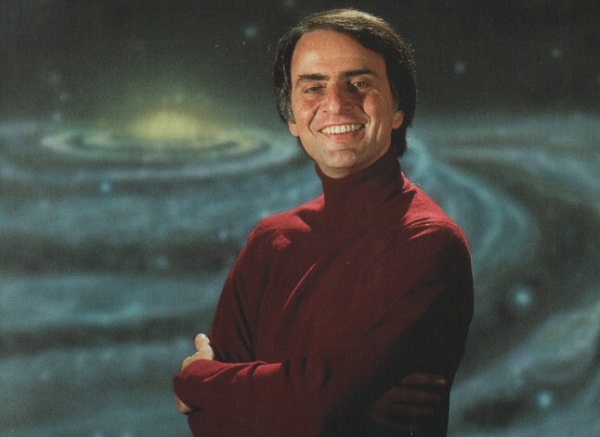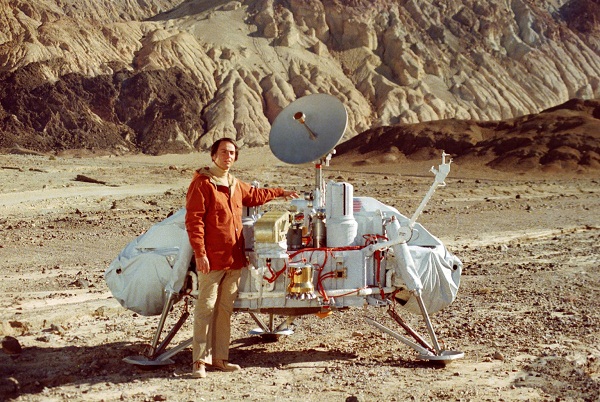|
Cosmos (Carl Sagan)
Together
with Ken Burns The Civil War, Carl Sagan’s Cosmos is
probably the most widely seen television documentary of all time, and
one of the most influential. Throughout 13 hour-long episodes, famed
Astrophysicist and science communicator Carl Sagan takes you through
every aspect of our universe, from the big bang, to Einstein’s theory of
relativity, to the emergence of life.

The Emmy
and Peabody Award-winning series was first broadcast in 1980, and
featured groundbreaking special effects that allowed Sagan to walk
through environments that were really miniatures, all while delivering
his precise narration. What comes across is his sincere awe and
fascination with the scale and machinations of the universe, and how
insignificant we all are by comparison. He also has the real gift of
communicating complex physics concepts in understandable terms, such as
in episode 10 “The Edge of Forever,” which has him explaining the shape
of the Universe by describing a two dimensional world from the point of
view of our 3D existence.
It’s is
fascinating, engrossing stuff, and even when Sagan’s goes over the top
with his grand hyperbole, you never get the sense he is any less than
sincere. A landmark in documentary television and the popularization of
science.
Audio/Video
Being a
30-year old television production shot on a mixture of film and video,
the video quality is about what is to be expected. The packaging
reportedly claims it’s been “digitally remastered and restored,” and
while often that’s mere marketing hooplah, here the result is an image
that is surprisingly clean if not very sharp. There’s little definition
in the images, plenty of edge artefacts and little vibrancy in colour,
but the content is so good these flaws are easily overlooked. The
soundtrack is a just fine Dolby 2.0.

Special
Features
With so
much core content and with Sagan’s death in 1996, there’s little in the
way of extras. There are short updates from Sagan for a number of the
episodes, recorded a decade following the series in 1990, which give a
brief overview of the then recent scientific and technological advances.
As much of the content is still valid today, thirty years later, these
updates feel not entirely necessary but are still interesting.
Otherwise, Disc One opens with a mellow introduction to the series from
series co-writer (and Sagan’s widow), Ann Druyan, and the last disc
features the “Fotografica Galactica”, a nine minute video of CGI
renditions of our solar system and real images from the Hubble Space
Telescope and the Cassini-Huygens mission to Saturn and Titan.
Full
Episode List
Episode 1 – The Shores of the Cosmic Ocean
At the beginning of this cosmic journey across space and time, Dr. Carl
Sagan takes us to the edge of the universe aboard a spaceship of the
imagination. Through beautiful special effects, we witness quasars,
exploding galaxies, star clusters, supernovas and pulsars. Returning to
our solar system, we enter a re-creation of the Alexandrian Library, the
seat of learning on Earth 2,000 years ago.
Episode
2 – One Voice in the Cosmic Fugue
Dr. Sagan's cosmic calendar makes the history of the universe
understandable and frames the origin of the Earth and the evolution of
life. We see the evolutionary process unfold, from microbes to humans.
Our understanding of how life developed on Earth enables us to venture
to other worlds for imaginative speculations on what forms life might
take elsewhere.
Episode
3 – The Harmony of the Worlds
This episode is a historical re-creation of the life of Johannes Kepler,
the last scientific astrologer, the first modern astronomer and the
author of the first science fiction novel. Kepler provided the insight
into how the moon and the planets move in their orbits and ultimately
how to journey to them. It's also a story about the scientific process
of discovery, and how the search for truth is never easy but always
worthwhile.
Episode
4 – Heaven and Hell
A descent through the hellish atmosphere of Venus to explore its
broiling surface serves as a warning to our world about the possible
consequences of the increasing greenhouse effect. Then Dr. Sagan leads
us on a tour of our solar system to see how other heavenly bodies have
suffered from various cosmic catastrophes.
Episode
5 – Blues for a Red Planet
Is there life on Mars? Dr. Sagan takes viewers on a tour of the red
planet first through the eyes of science fiction authors, and then
through the unblinking eyes of two Viking spacecrafts that have sent
thousands of pictures of the stunning Martian landscape back to Earth
since 1976. Though based on older Mars missions, Sagan's analysis still
holds true.
Episode
6 – Travelers' Tales
Dr. Sagan compares the exhilaration of 17th-century Dutch explorers who
ventured in sailing ships halfway around our planet in their quest for
wealth and knowledge to an inside view of the excitement around
Voyager's expeditions to Jupiter and Saturn. The newly acquired
treasures of our present golden age of exploration are the focus of this
episode.
Episode
7 – The Backbone of Night
Humans once thought the stars were campfires in the sky and the Milky
Way "the backbone of night." In this fascinating segment Dr. Sagan takes
us back to ancient Greece, when the basic question "what are the stars?"
was first asked. He visits the Brooklyn elementary school of his
childhood, where this same question is still on students' minds.
Episode
8 – Travels in Space and Time
A voyage to see how star patterns change over millions of years is
followed by a journey to the planets of other stars, and a look at the
possibility of time travel. This takes us to Italy, where a young Albert
Einstein first wondered what it would be like to ride on a beam of
light.
Episode
9 –The Lives of the Stars
Using computer animation and amazing astronomical art, Dr. Sagan shows
how stars are born, live, die and sometimes collapse to form neutron
stars or black holes. We then journey into the future to witness "the
last perfect day on Earth," 5 billion years from now, after which the
sun will engulf our planet in the fires of its death throes.
Episode
10 – The Edge of Forever
Dr. Sagan leads us on some awesome trips — to a time when galaxies were
beginning to form, to India to explore the infinite cycles of Hindu
cosmology, and to show how humans of this century discovered the
expanding universe and its origin in the big bang. He disappears down a
black hole and reappears in New Mexico to show us an array of 17
telescopes probing the farthest reaches of space.
Episode
11 – The Persistence of Memory
The brain is the focus of this fascinating portion of our journey as Dr.
Sagan examines another of the intelligent creatures with whom we share
the planet Earth — whales. Then we wind through the maze of the human
brain to witness the architecture of thought. We see how genes, brains
and books store the information necessary for human survival.
Episode
12 – Encyclopedia Galactica
Are there alien intelligences? How could we communicate with them? What
about UFOs? The answers to these questions take us to Egypt to decode
ancient hieroglyphics, to the largest radio telescope on Earth and, in
the Spaceship of the Imagination, to visit other civilizations in space.
Dr. Sagan answers questions such as: "What is the life span of a
planetary civilization?" and "Will we one day hook up with a network of
civilizations in the Milky Way galaxy?"
Episode
13 – Who Speaks for Earth?
Through the use of special effects we retrace the 15-billion-year
journey from the big bang to the present. We also hear the tragic story
of the martyrdom of Hypatia, the woman scientist of ancient Alexandria.
This is the famous episode on nuclear war in which Dr. Sagan argues that
our responsibility for survival is owed not just to ourselves, but also
to the cosmos, ancient and vast, from which we spring. |